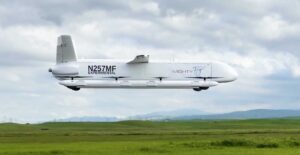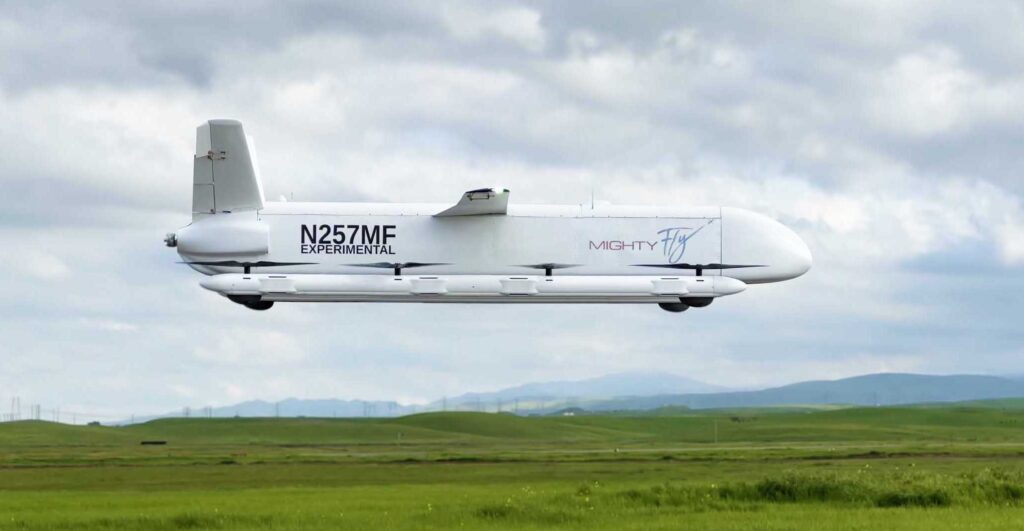 MightyFly makes long-range autonomous cargo drones capable of carrying over 100 pounds of cargo. This is a development that has the potential to revolutionize express shipping for a wide range of industries.
MightyFly makes long-range autonomous cargo drones capable of carrying over 100 pounds of cargo. This is a development that has the potential to revolutionize express shipping for a wide range of industries.
Below is a guest post Single seat consulting Founder Bill Johnson. DRONELIFE does not make or receive payments for guest posts.
MightyFly Wins $150,000 Demo Grant to Showcase Tools Revolutionizing Logistics
By Bill Johnson
Mighty FlyThe company, a manufacturer and operator of long-range autonomous hybrid electric vertical take-off and landing (eVTOL) cargo aircraft, announced in a June 28, 2023 press release that on May 30, 2023, it will receive $150,000 from the Michigan Mobility Fund program. Announced that the subsidy will be awarded. Under the terms of the grant, MightyFly will conduct the first public demonstration of an autonomous fixed-wing eVTOL aircraft, showcasing a 100-pound cargo delivery.
Sponsored by the Michigan Office of Future Mobility and Electrification (OFME), these demonstration flights provide MightyFly with an opportunity to showcase automated cargo delivery of £100. In this way, MightyFly hopes to provide prospective customers with tangible evidence of express delivery solutions that will open up new logistics opportunities for companies.
As detailed in the press release, the logistics needs of Michigan’s manufacturing, automotive, logistics, retail, chemical and pharmaceutical industries demonstrate MightyFly’s new ways to ship products, parts, consumables and a variety of commodities provides an ideal scenario for These businesses in Michigan need express logistics with fast, efficient and affordable same-day delivery services. MightyFly believes its one-shot business-to-business (B2B) delivery service reduces costs for just-in-time manufacturing lines, timely delivery of critical medical packages, and fast-moving consumer goods to retailers. We believe in providing a prompt replacement.
MightyFly CEO Manal Habib said in a recent interview that the demonstration flights will take place over the course of two weeks and will focus on several key use cases of particular interest to the expected customer base. I explained that I planned to conduct a point-to-point flight. “We will be demonstrating fully autonomous flight from takeoff to cruise flight to landing while demonstrating the delivery of various cargoes. [of a large autonomous fixed-wing eVTOL] to the market. We will demonstrate to our future customers what we can offer, how good it is and how convenient it is. Convenience is priceless most of the time!”
Habib believes Michigan is the perfect place to demonstrate this ability. To her, Michigan is very supportive of startups like MightyFly while expanding its industrial base into advanced air mobility. “Michigan is currently making a significant effort to enter the advanced air mobility market. Being in the transportation sector and seeing the advances in rail transportation, entering the aviation market is an exciting prospect. It makes sense, which is why they go to great lengths to attract a lot of startups.”
He also noted the state’s commitment to both supporting its long-standing auto industry and transitioning it into the future of mobility. “There is a sizable need for affordable same-day delivery services.” manufacturing work time. This applies not only to manufacturing, but also to retail and other businesses, but it is the automotive industry that stands out in Michigan, and the government is now supporting the automotive industry and ensuring that Michigan participates. The point is that we are trying to support the aviation industry to make it possible. The future of the future is in aviation. “
The press release explains that the grant program is managed by OFME as part of a statewide strategy to ensure Michigan remains a global leader in the future of mobility, electrification policy and innovation. there is The program will promote and scale new mobility solutions that improve environmental sustainability by incentivizing EV adoption and building charging infrastructure, increasing access to affordable and reliable transportation. It was initiated by the Michigan Economic Development Corporation (MEDC) and the Michigan Department of Transportation (MDOT) with the aim of To modernize the existing transportation system for Michigan residents. OFME has previously partnered with the Michigan Unmanned Aerial Systems Consortium (MUASC) to facilitate testing of autonomous aircraft in Michigan. Working with state governments, regulators, academia, and private industry, OFME is building a robust ecosystem of partners who can lead the adoption and use of innovative mobility solutions like MightyFly.
OFME Technology Activation Manager Charlie Tyson said: “The future of mobility is not just vehicles, it can be in the air, land and sea.” We are delighted to be in a position to support MightyFly through the MMFP program and assist in their continued efforts to grow in Michigan.”
Habib’s enthusiasm for the opportunity to demonstrate the capabilities of his aircraft is evident in his press release statement. “We are thrilled to be the first large-scale autonomous fixed-wing eVTOL cargo delivery company to demonstrate how autonomous air expedited logistics solutions can better serve the people of Michigan. , will be the first stepping stone to enable efficient flow of goods around the world, giving everyone access to reliable and affordable same-day delivery.We are making history. !”
MightyFly’s vision continues after these demonstrations, which are performed under the FAA’s Special Airworthiness Certificate. In addition to this project, MightyFly is currently scoping and planning its 2024-2025 proof-of-concept (POC) trials with a partner. Habib said he is working closely with the FAA toward the ultimate goal of combined type and model Part 135 approval. Manufacturing certification to act as a logistics service provider.
MightyFly’s current facility, which has built R&D aircraft, will be able to produce multiple third-generation production aircraft. However, as we grow our business, we are open to other expansion options. Habib said: “We are now developing full capacity to manufacture in-house. This allows us to react quickly, especially since having everything in-house allows us to develop aircraft more quickly, especially during the R&D phase. will be possible.”
MightyFly believes its vehicles have three key elements needed to solve the just-in-time logistics challenges faced by hardware manufacturers. The first is autonomy and the cost savings that autonomy offers operators. “Aircraft that are electric but not autonomous have a major disadvantage because they still have to pay for labor, and this is the biggest cost factor in logistics,” Habib said.
Equally important to Habib is the convenience and time savings required for vertical take-off and landing capabilities to support just-in-time operations. On this point she is adamant: “If we really want to provide these time-of-day convenient solutions, we need to be able to deliver in one shot from source to destination. load, do the 2nd step from airport to airport, then the 3rd step, now there are 3 stages, each with loading and unloading, forget about convenience and time units Please, now<配達> takes more than a day. Therefore, if these aircraft do not combine autonomy and eVTOL, there is a significant disadvantage.
The final factor is economies of scale. MightyFly touts its third-generation autonomous cargo aircraft as having a 100-pound cargo capacity and a 6-foot by 19-inch by 18-inch cargo bay, capable of carrying up to 212 small USPS packages. .
For Habib, small, single-package delivery drones are no match. “There are a lot of small ‘logistics drones’ out there, but the smaller ones lose a lot of economies of scale. It’s like FedEx or UPS working on a motorbike if he’s only carrying one package.”
The air logistics market appears to be highly competitive. However, in Habib’s eyes, Mighty Fly seems to be in a good position. “Once you have technology like ours, it opens up a huge market,” she says. He added, “So you want to combine autonomy and eVTOL aspects and long-range economies of scale into one solution. In fact, very few players combine all these advantages. The market could make better use of them.”
With this grant and subsequent demonstrations, MightyFly looks well on its way to becoming one of those few companies.
 Bill Johnson is the founder of Single Seat Consulting LLC, which provides strategic, operational and business opportunity advice to companies serving the Department of Defense R&D and advanced air mobility markets. He has a background in naval aviation and is a senior director at Northrop Grumman Mission Systems and is currently serving as an emerging aeronautical technical advisor for women and drones. He earned a BS in Aerospace Engineering from the United States Naval Academy, his MBA from the Florida Institute of Technology, and a Master’s degree in National Security and Strategic Studies from the United States Naval War College.
Bill Johnson is the founder of Single Seat Consulting LLC, which provides strategic, operational and business opportunity advice to companies serving the Department of Defense R&D and advanced air mobility markets. He has a background in naval aviation and is a senior director at Northrop Grumman Mission Systems and is currently serving as an emerging aeronautical technical advisor for women and drones. He earned a BS in Aerospace Engineering from the United States Naval Academy, his MBA from the Florida Institute of Technology, and a Master’s degree in National Security and Strategic Studies from the United States Naval War College.
Miriam McNabb, editor-in-chief of DRONELIFE and CEO of professional drone services marketplace JobForDrones, is a keen observer of the emerging drone industry and drone regulatory environment. Miriam is an international speaker and industry recognized figure, with over 3,000 articles focused on the commercial drone space. Miriam has a degree from the University of Chicago and he has over 20 years of experience in high tech sales and marketing new technologies.
For drone industry consulting or writing, email Miriam.
twitter:@spaldingbarker
Subscribe to Drone Life here.
